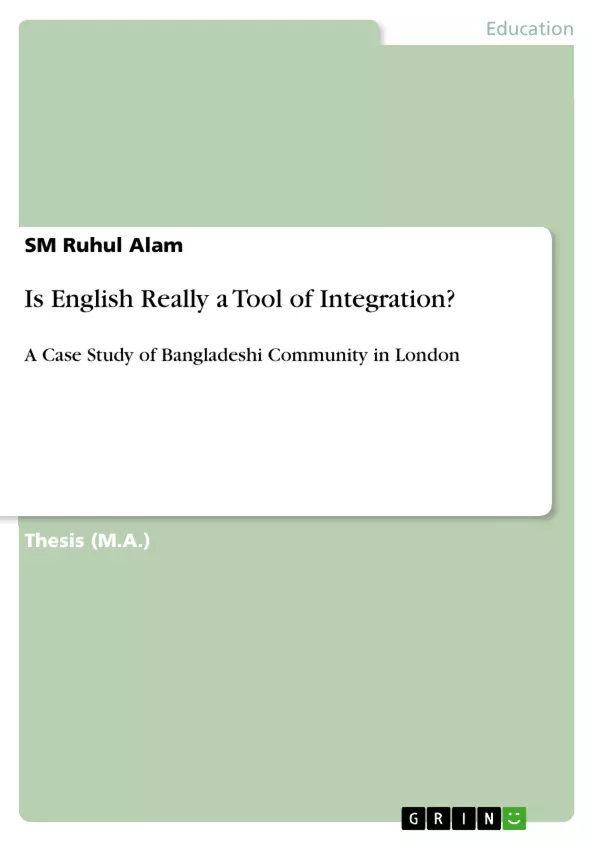This research project is an attempt to examine whether English is a tool of social and economic integration of the Bangladeshi community in London. Integration has recently created rigorous in the United Kingdom (UK). One of the reasons is that UK is a multinational country where people from all countries come to live and integration is not going the way it is expected. An in-depth study of the community’s English language skill as a tool of integration has not been carried out yet. This study is an attempt to discuss subject by answering five questions. I will specifically focus on the community’s survival without English and the community’s present view regarding the necessity of learning English for integration process. It is expected that the findings of study would indicate the community has a positive attitude towards English as a tool of integration. This research will benefit not only Bangladeshi immigrants but also other immigrants living in the UK.
Inhaltsverzeichnis (Table of Contents)
- Chapter One
- 1.1 Introduction
- 1.2 Literature Review
- 1.3 Methodology
- 1.4 Data Analysis
- Chapter Two
- 2.1 Socio-economic Background
- 2.2 Language and Identity
- 2.3 English Language Skills
- Chapter Three
- 3.1 Integration and Social Exclusion
- 3.2 Barriers to Integration
- 3.3 The Role of English
- Chapter Four
- 4.1 The Impact of English Language Proficiency
- 4.2 Educational Attainment
- 4.3 Employment Opportunities
- Chapter Five
- 5.1 Conclusion
- 5.2 Recommendations
Zielsetzung und Themenschwerpunkte (Objectives and Key Themes)
This research project aims to examine whether English serves as a tool for the social and economic integration of the Bangladeshi community in London. The study explores the relationship between English language proficiency and integration, considering factors such as socio-economic background, language and identity, and barriers to integration.
- The role of English language proficiency in the integration of Bangladeshi immigrants in London.
- The socio-economic background and integration experiences of the Bangladeshi community.
- The relationship between language and identity, and the impact of language maintenance and shift on integration.
- Barriers to integration faced by the Bangladeshi community, including discrimination and social exclusion.
- The impact of English language proficiency on educational attainment and employment opportunities.
Zusammenfassung der Kapitel (Chapter Summaries)
Chapter One introduces the topic of immigration and integration in the United Kingdom, highlighting the importance of language skills in the process. It outlines the research objectives and methodology, focusing on the Bangladeshi community in London. Chapter Two delves into the socio-economic background of the Bangladeshi community, exploring their language and identity, and their English language skills. Chapter Three examines the concept of integration and social exclusion, analyzing the barriers to integration faced by the Bangladeshi community and the role of English in this context. Chapter Four investigates the impact of English language proficiency on educational attainment and employment opportunities for the Bangladeshi community in London.
Schlüsselwörter (Keywords)
The primary keywords and focus topics include: Bangladeshi community, London, integration, social exclusion, English language proficiency, language and identity, socio-economic background, education, employment, and immigration.
Frequently Asked Questions
Is English proficiency essential for integration in London?
Yes, English language skills are considered a primary tool for both social and economic integration, helping immigrants access better education and employment opportunities.
What barriers do Bangladeshi immigrants face regarding integration?
Barriers include social exclusion, discrimination, and limited English proficiency, which can lead to economic disadvantages and isolation within ethnic enclaves.
How does language affect the identity of the Bangladeshi community?
Language is closely tied to cultural identity. While maintaining their native language is important for heritage, shifting towards English is often necessary for navigating British society.
Does English proficiency impact employment for Bangladeshi immigrants?
Research indicates a strong correlation between English fluency and higher employment rates, as it allows for broader job searches and better communication in professional settings.
What is the community's attitude towards learning English?
The study suggests that the Bangladeshi community generally has a positive attitude towards learning English, viewing it as a necessary skill for survival and success in the UK.
- Citation du texte
- SM Ruhul Alam (Auteur), 2008, Is English Really a Tool of Integration?, Munich, GRIN Verlag, https://www.grin.com/document/152922



